Business Law Report: Impact of Laws on the Potato Council
VerifiedAdded on 2020/01/21
|10
|3053
|87
Report
AI Summary
This report provides a comprehensive analysis of business law principles applicable to the Potato Council, a part of the Agriculture and Horticulture Board in the UK. It explores the legal sources impacting the business, including EU and national laws, and examines the government's role in law-making and its effectiveness. The report delves into the distinction between employed and self-employed workers, analyzing the council's duties towards its employees and the impact of employment decisions on the business. It also outlines various business solutions, including methods for raising capital and the roles of key officers within an organization. Furthermore, the report addresses alternative dispute resolution methods, such as arbitration, and discusses the advantages and disadvantages of different approaches to resolving legal issues. The report emphasizes the importance of adhering to legal frameworks and finding effective solutions for business challenges within the context of the UK's legal system. This assignment is contributed by a student to be published on the website Desklib, a platform which provides all the necessary AI based study tools for students.
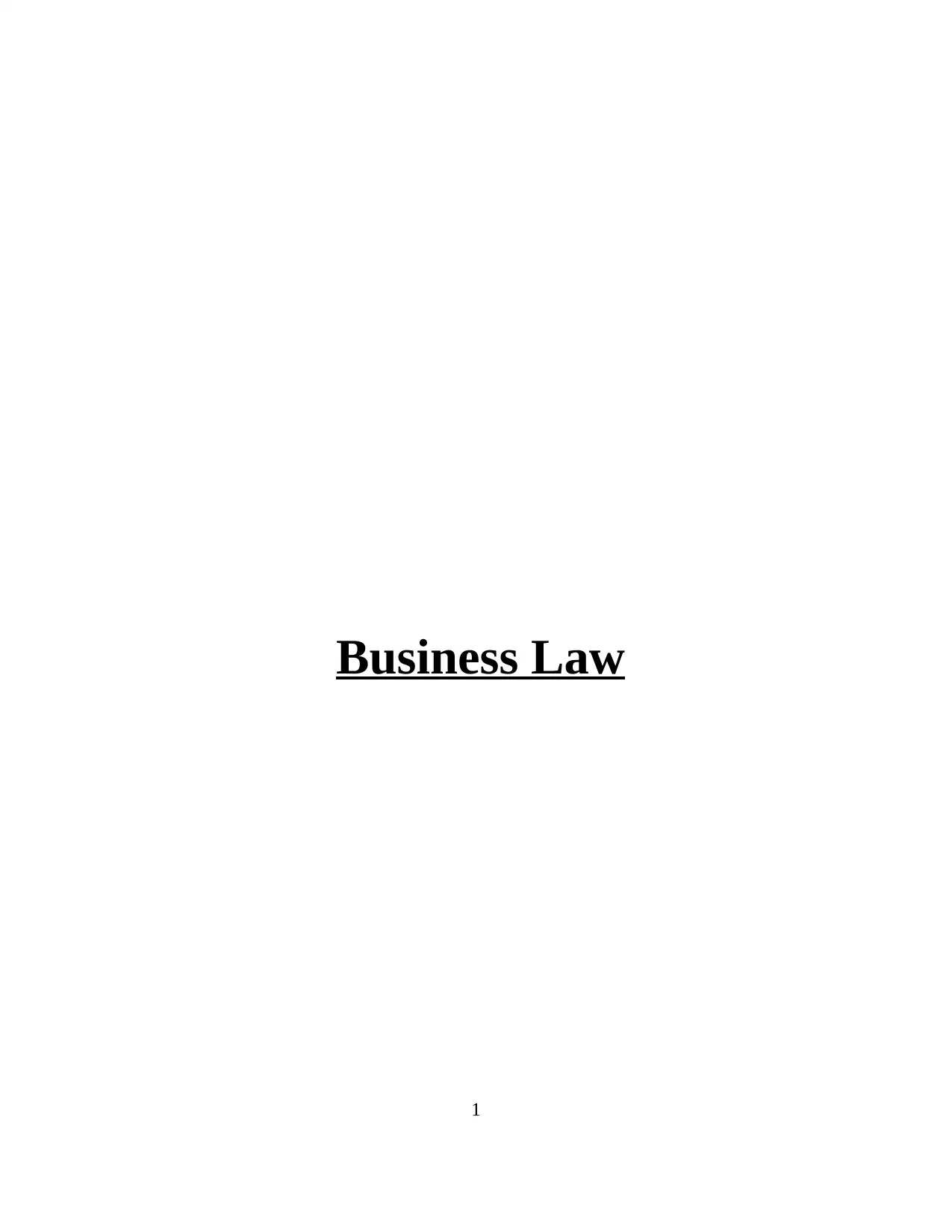
Business Law
1
1
Paraphrase This Document
Need a fresh take? Get an instant paraphrase of this document with our AI Paraphraser
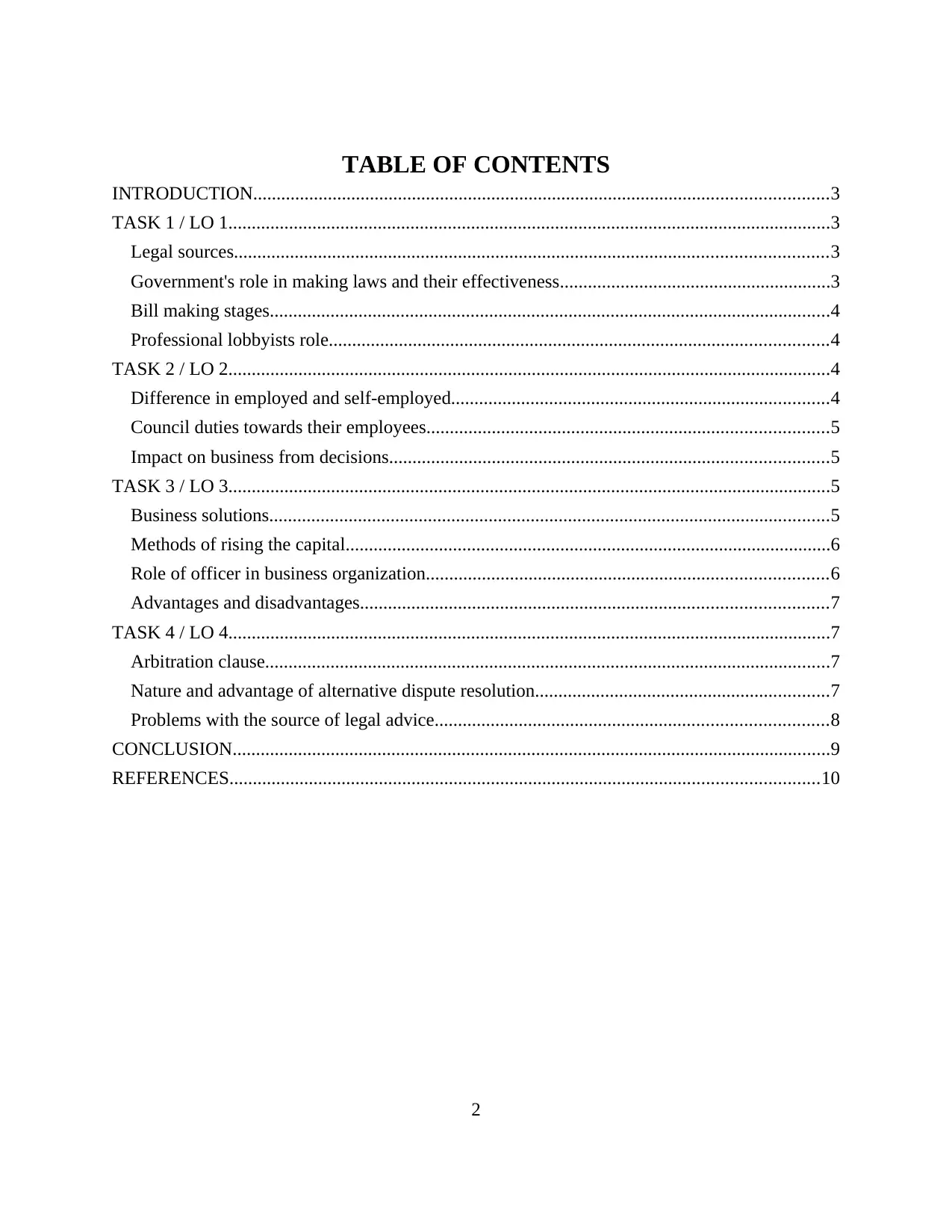
TABLE OF CONTENTS
INTRODUCTION...........................................................................................................................3
TASK 1 / LO 1.................................................................................................................................3
Legal sources...............................................................................................................................3
Government's role in making laws and their effectiveness..........................................................3
Bill making stages........................................................................................................................4
Professional lobbyists role...........................................................................................................4
TASK 2 / LO 2.................................................................................................................................4
Difference in employed and self-employed.................................................................................4
Council duties towards their employees......................................................................................5
Impact on business from decisions..............................................................................................5
TASK 3 / LO 3.................................................................................................................................5
Business solutions........................................................................................................................5
Methods of rising the capital........................................................................................................6
Role of officer in business organization......................................................................................6
Advantages and disadvantages....................................................................................................7
TASK 4 / LO 4.................................................................................................................................7
Arbitration clause.........................................................................................................................7
Nature and advantage of alternative dispute resolution...............................................................7
Problems with the source of legal advice....................................................................................8
CONCLUSION................................................................................................................................9
REFERENCES..............................................................................................................................10
2
INTRODUCTION...........................................................................................................................3
TASK 1 / LO 1.................................................................................................................................3
Legal sources...............................................................................................................................3
Government's role in making laws and their effectiveness..........................................................3
Bill making stages........................................................................................................................4
Professional lobbyists role...........................................................................................................4
TASK 2 / LO 2.................................................................................................................................4
Difference in employed and self-employed.................................................................................4
Council duties towards their employees......................................................................................5
Impact on business from decisions..............................................................................................5
TASK 3 / LO 3.................................................................................................................................5
Business solutions........................................................................................................................5
Methods of rising the capital........................................................................................................6
Role of officer in business organization......................................................................................6
Advantages and disadvantages....................................................................................................7
TASK 4 / LO 4.................................................................................................................................7
Arbitration clause.........................................................................................................................7
Nature and advantage of alternative dispute resolution...............................................................7
Problems with the source of legal advice....................................................................................8
CONCLUSION................................................................................................................................9
REFERENCES..............................................................................................................................10
2
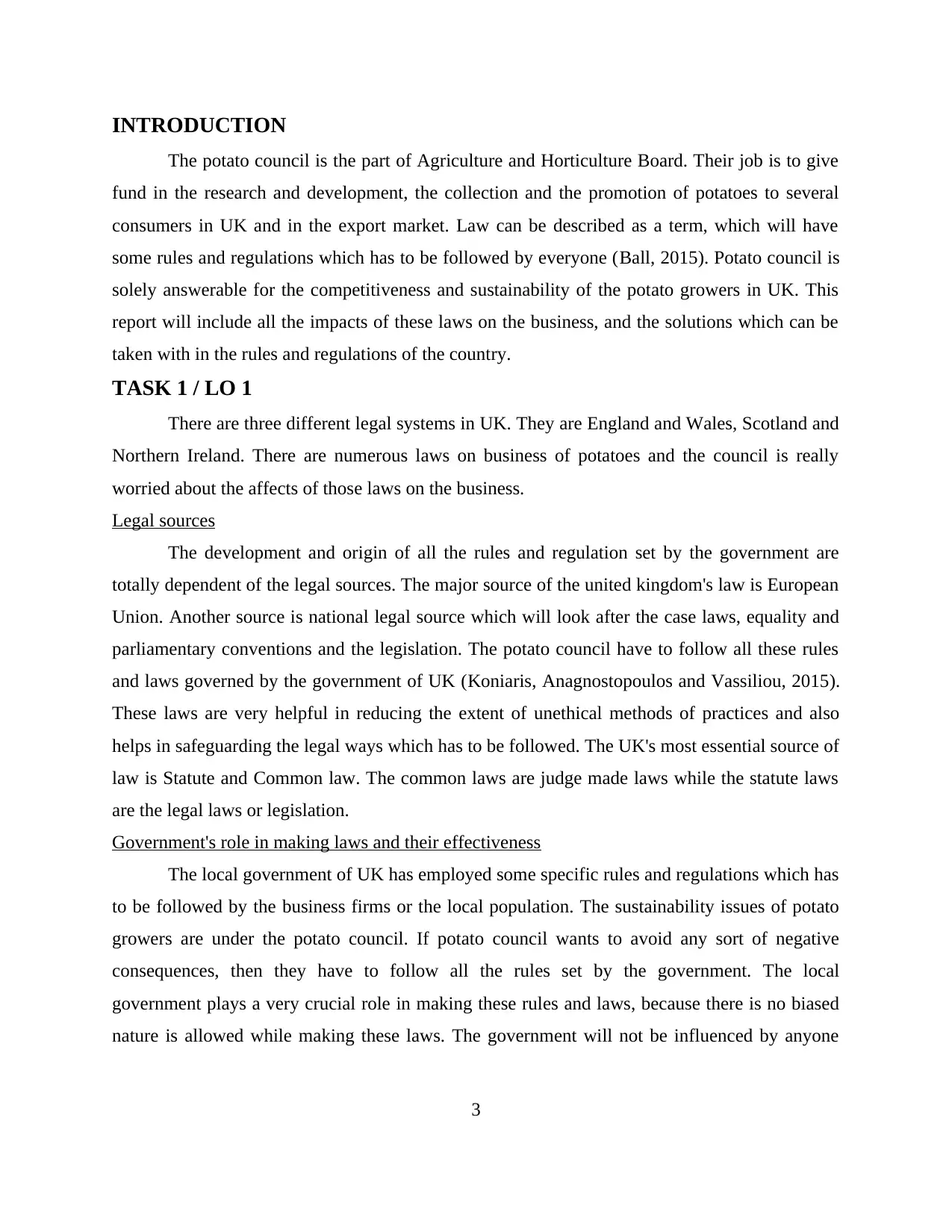
INTRODUCTION
The potato council is the part of Agriculture and Horticulture Board. Their job is to give
fund in the research and development, the collection and the promotion of potatoes to several
consumers in UK and in the export market. Law can be described as a term, which will have
some rules and regulations which has to be followed by everyone (Ball, 2015). Potato council is
solely answerable for the competitiveness and sustainability of the potato growers in UK. This
report will include all the impacts of these laws on the business, and the solutions which can be
taken with in the rules and regulations of the country.
TASK 1 / LO 1
There are three different legal systems in UK. They are England and Wales, Scotland and
Northern Ireland. There are numerous laws on business of potatoes and the council is really
worried about the affects of those laws on the business.
Legal sources
The development and origin of all the rules and regulation set by the government are
totally dependent of the legal sources. The major source of the united kingdom's law is European
Union. Another source is national legal source which will look after the case laws, equality and
parliamentary conventions and the legislation. The potato council have to follow all these rules
and laws governed by the government of UK (Koniaris, Anagnostopoulos and Vassiliou, 2015).
These laws are very helpful in reducing the extent of unethical methods of practices and also
helps in safeguarding the legal ways which has to be followed. The UK's most essential source of
law is Statute and Common law. The common laws are judge made laws while the statute laws
are the legal laws or legislation.
Government's role in making laws and their effectiveness
The local government of UK has employed some specific rules and regulations which has
to be followed by the business firms or the local population. The sustainability issues of potato
growers are under the potato council. If potato council wants to avoid any sort of negative
consequences, then they have to follow all the rules set by the government. The local
government plays a very crucial role in making these rules and laws, because there is no biased
nature is allowed while making these laws. The government will not be influenced by anyone
3
The potato council is the part of Agriculture and Horticulture Board. Their job is to give
fund in the research and development, the collection and the promotion of potatoes to several
consumers in UK and in the export market. Law can be described as a term, which will have
some rules and regulations which has to be followed by everyone (Ball, 2015). Potato council is
solely answerable for the competitiveness and sustainability of the potato growers in UK. This
report will include all the impacts of these laws on the business, and the solutions which can be
taken with in the rules and regulations of the country.
TASK 1 / LO 1
There are three different legal systems in UK. They are England and Wales, Scotland and
Northern Ireland. There are numerous laws on business of potatoes and the council is really
worried about the affects of those laws on the business.
Legal sources
The development and origin of all the rules and regulation set by the government are
totally dependent of the legal sources. The major source of the united kingdom's law is European
Union. Another source is national legal source which will look after the case laws, equality and
parliamentary conventions and the legislation. The potato council have to follow all these rules
and laws governed by the government of UK (Koniaris, Anagnostopoulos and Vassiliou, 2015).
These laws are very helpful in reducing the extent of unethical methods of practices and also
helps in safeguarding the legal ways which has to be followed. The UK's most essential source of
law is Statute and Common law. The common laws are judge made laws while the statute laws
are the legal laws or legislation.
Government's role in making laws and their effectiveness
The local government of UK has employed some specific rules and regulations which has
to be followed by the business firms or the local population. The sustainability issues of potato
growers are under the potato council. If potato council wants to avoid any sort of negative
consequences, then they have to follow all the rules set by the government. The local
government plays a very crucial role in making these rules and laws, because there is no biased
nature is allowed while making these laws. The government will not be influenced by anyone
3
⊘ This is a preview!⊘
Do you want full access?
Subscribe today to unlock all pages.

Trusted by 1+ million students worldwide
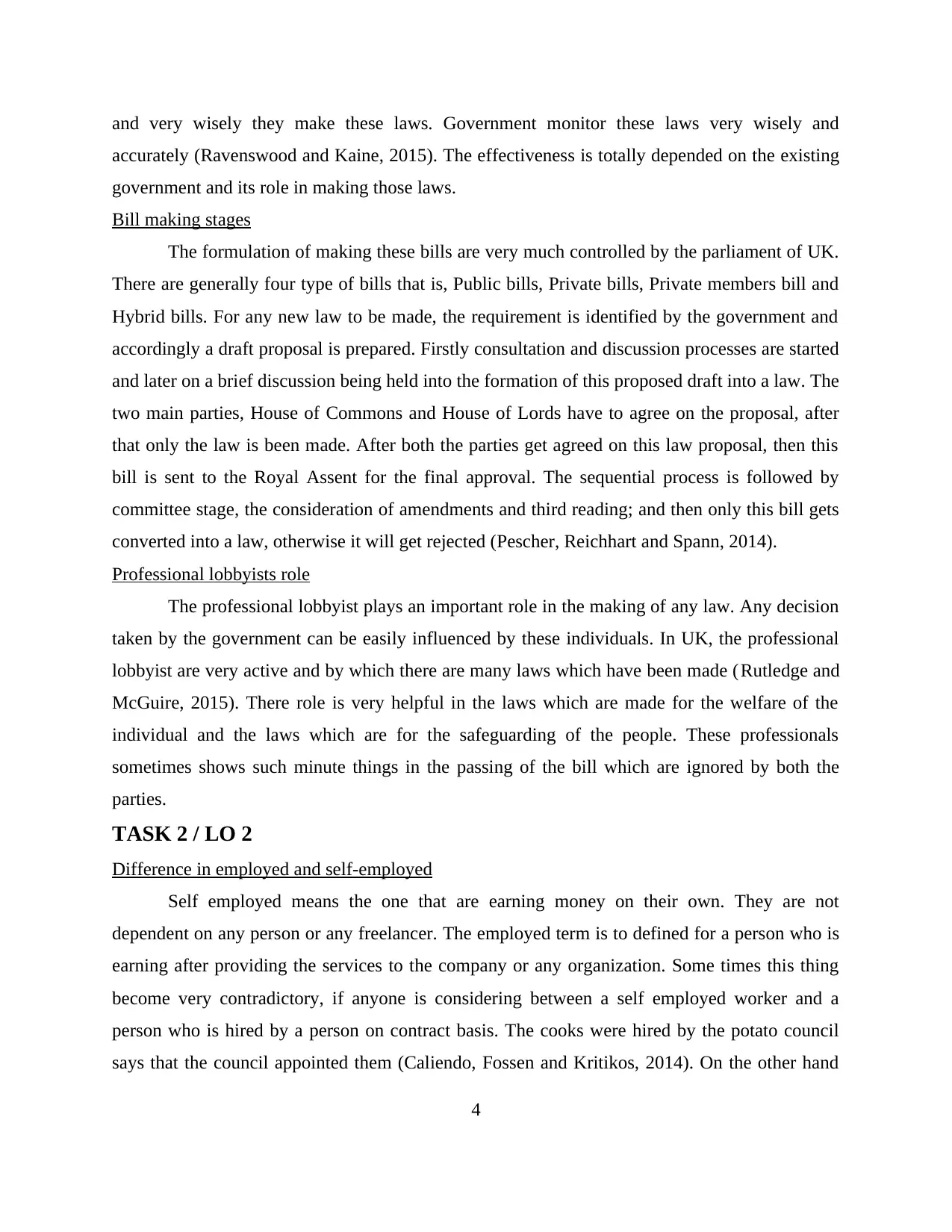
and very wisely they make these laws. Government monitor these laws very wisely and
accurately (Ravenswood and Kaine, 2015). The effectiveness is totally depended on the existing
government and its role in making those laws.
Bill making stages
The formulation of making these bills are very much controlled by the parliament of UK.
There are generally four type of bills that is, Public bills, Private bills, Private members bill and
Hybrid bills. For any new law to be made, the requirement is identified by the government and
accordingly a draft proposal is prepared. Firstly consultation and discussion processes are started
and later on a brief discussion being held into the formation of this proposed draft into a law. The
two main parties, House of Commons and House of Lords have to agree on the proposal, after
that only the law is been made. After both the parties get agreed on this law proposal, then this
bill is sent to the Royal Assent for the final approval. The sequential process is followed by
committee stage, the consideration of amendments and third reading; and then only this bill gets
converted into a law, otherwise it will get rejected (Pescher, Reichhart and Spann, 2014).
Professional lobbyists role
The professional lobbyist plays an important role in the making of any law. Any decision
taken by the government can be easily influenced by these individuals. In UK, the professional
lobbyist are very active and by which there are many laws which have been made (Rutledge and
McGuire, 2015). There role is very helpful in the laws which are made for the welfare of the
individual and the laws which are for the safeguarding of the people. These professionals
sometimes shows such minute things in the passing of the bill which are ignored by both the
parties.
TASK 2 / LO 2
Difference in employed and self-employed
Self employed means the one that are earning money on their own. They are not
dependent on any person or any freelancer. The employed term is to defined for a person who is
earning after providing the services to the company or any organization. Some times this thing
become very contradictory, if anyone is considering between a self employed worker and a
person who is hired by a person on contract basis. The cooks were hired by the potato council
says that the council appointed them (Caliendo, Fossen and Kritikos, 2014). On the other hand
4
accurately (Ravenswood and Kaine, 2015). The effectiveness is totally depended on the existing
government and its role in making those laws.
Bill making stages
The formulation of making these bills are very much controlled by the parliament of UK.
There are generally four type of bills that is, Public bills, Private bills, Private members bill and
Hybrid bills. For any new law to be made, the requirement is identified by the government and
accordingly a draft proposal is prepared. Firstly consultation and discussion processes are started
and later on a brief discussion being held into the formation of this proposed draft into a law. The
two main parties, House of Commons and House of Lords have to agree on the proposal, after
that only the law is been made. After both the parties get agreed on this law proposal, then this
bill is sent to the Royal Assent for the final approval. The sequential process is followed by
committee stage, the consideration of amendments and third reading; and then only this bill gets
converted into a law, otherwise it will get rejected (Pescher, Reichhart and Spann, 2014).
Professional lobbyists role
The professional lobbyist plays an important role in the making of any law. Any decision
taken by the government can be easily influenced by these individuals. In UK, the professional
lobbyist are very active and by which there are many laws which have been made (Rutledge and
McGuire, 2015). There role is very helpful in the laws which are made for the welfare of the
individual and the laws which are for the safeguarding of the people. These professionals
sometimes shows such minute things in the passing of the bill which are ignored by both the
parties.
TASK 2 / LO 2
Difference in employed and self-employed
Self employed means the one that are earning money on their own. They are not
dependent on any person or any freelancer. The employed term is to defined for a person who is
earning after providing the services to the company or any organization. Some times this thing
become very contradictory, if anyone is considering between a self employed worker and a
person who is hired by a person on contract basis. The cooks were hired by the potato council
says that the council appointed them (Caliendo, Fossen and Kritikos, 2014). On the other hand
4
Paraphrase This Document
Need a fresh take? Get an instant paraphrase of this document with our AI Paraphraser
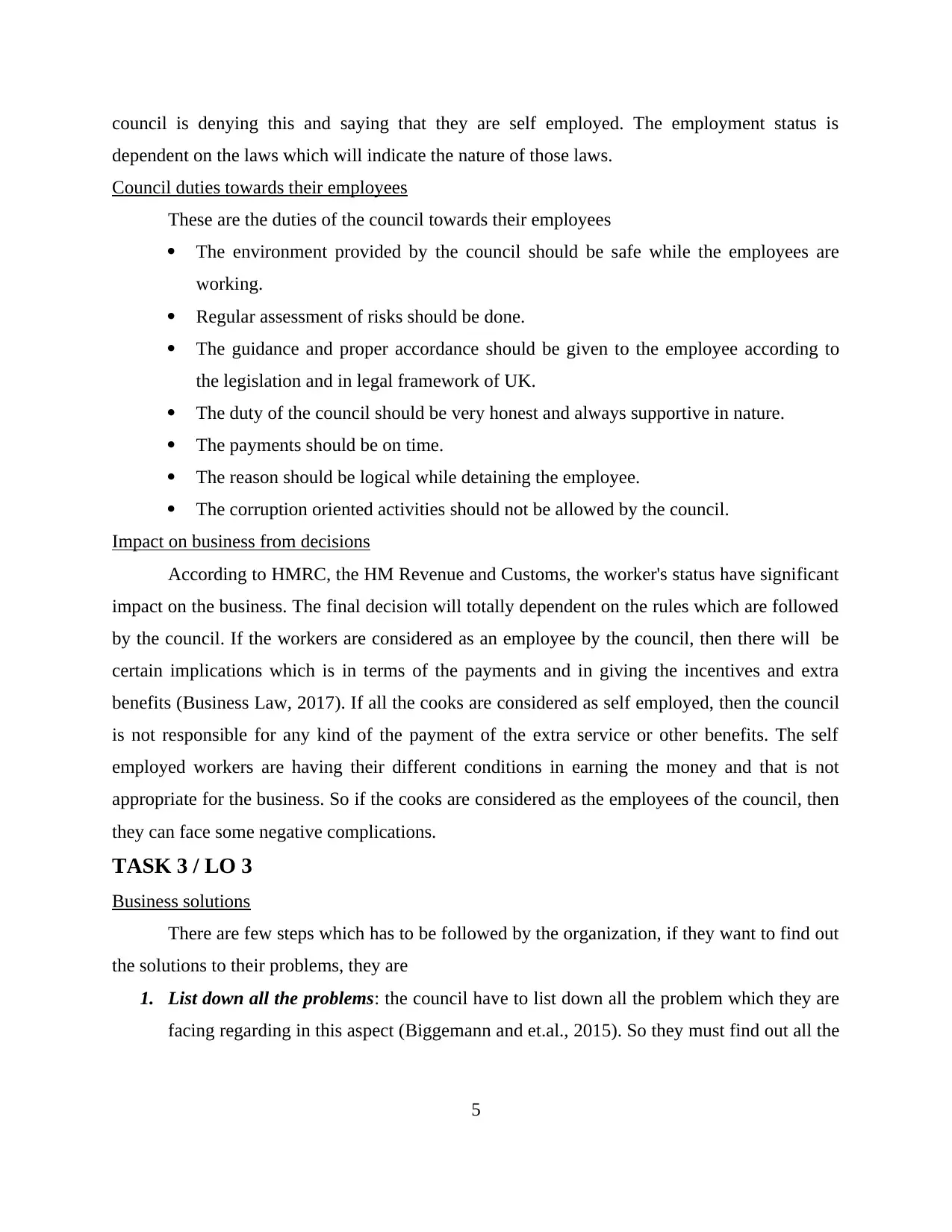
council is denying this and saying that they are self employed. The employment status is
dependent on the laws which will indicate the nature of those laws.
Council duties towards their employees
These are the duties of the council towards their employees
The environment provided by the council should be safe while the employees are
working.
Regular assessment of risks should be done.
The guidance and proper accordance should be given to the employee according to
the legislation and in legal framework of UK.
The duty of the council should be very honest and always supportive in nature.
The payments should be on time.
The reason should be logical while detaining the employee.
The corruption oriented activities should not be allowed by the council.
Impact on business from decisions
According to HMRC, the HM Revenue and Customs, the worker's status have significant
impact on the business. The final decision will totally dependent on the rules which are followed
by the council. If the workers are considered as an employee by the council, then there will be
certain implications which is in terms of the payments and in giving the incentives and extra
benefits (Business Law, 2017). If all the cooks are considered as self employed, then the council
is not responsible for any kind of the payment of the extra service or other benefits. The self
employed workers are having their different conditions in earning the money and that is not
appropriate for the business. So if the cooks are considered as the employees of the council, then
they can face some negative complications.
TASK 3 / LO 3
Business solutions
There are few steps which has to be followed by the organization, if they want to find out
the solutions to their problems, they are
1. List down all the problems: the council have to list down all the problem which they are
facing regarding in this aspect (Biggemann and et.al., 2015). So they must find out all the
5
dependent on the laws which will indicate the nature of those laws.
Council duties towards their employees
These are the duties of the council towards their employees
The environment provided by the council should be safe while the employees are
working.
Regular assessment of risks should be done.
The guidance and proper accordance should be given to the employee according to
the legislation and in legal framework of UK.
The duty of the council should be very honest and always supportive in nature.
The payments should be on time.
The reason should be logical while detaining the employee.
The corruption oriented activities should not be allowed by the council.
Impact on business from decisions
According to HMRC, the HM Revenue and Customs, the worker's status have significant
impact on the business. The final decision will totally dependent on the rules which are followed
by the council. If the workers are considered as an employee by the council, then there will be
certain implications which is in terms of the payments and in giving the incentives and extra
benefits (Business Law, 2017). If all the cooks are considered as self employed, then the council
is not responsible for any kind of the payment of the extra service or other benefits. The self
employed workers are having their different conditions in earning the money and that is not
appropriate for the business. So if the cooks are considered as the employees of the council, then
they can face some negative complications.
TASK 3 / LO 3
Business solutions
There are few steps which has to be followed by the organization, if they want to find out
the solutions to their problems, they are
1. List down all the problems: the council have to list down all the problem which they are
facing regarding in this aspect (Biggemann and et.al., 2015). So they must find out all the
5
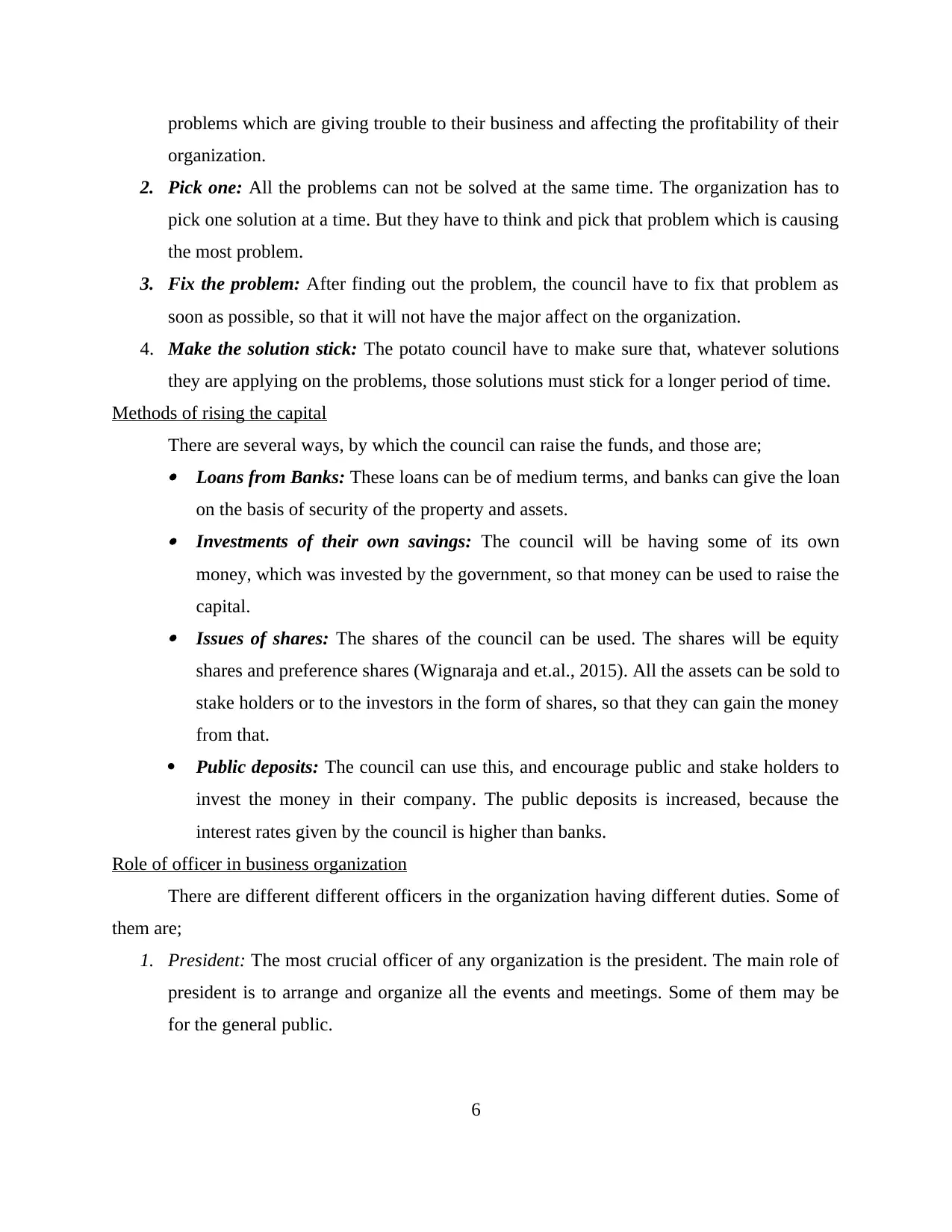
problems which are giving trouble to their business and affecting the profitability of their
organization.
2. Pick one: All the problems can not be solved at the same time. The organization has to
pick one solution at a time. But they have to think and pick that problem which is causing
the most problem.
3. Fix the problem: After finding out the problem, the council have to fix that problem as
soon as possible, so that it will not have the major affect on the organization.
4. Make the solution stick: The potato council have to make sure that, whatever solutions
they are applying on the problems, those solutions must stick for a longer period of time.
Methods of rising the capital
There are several ways, by which the council can raise the funds, and those are;
Loans from Banks: These loans can be of medium terms, and banks can give the loan
on the basis of security of the property and assets.
Investments of their own savings: The council will be having some of its own
money, which was invested by the government, so that money can be used to raise the
capital.
Issues of shares: The shares of the council can be used. The shares will be equity
shares and preference shares (Wignaraja and et.al., 2015). All the assets can be sold to
stake holders or to the investors in the form of shares, so that they can gain the money
from that.
Public deposits: The council can use this, and encourage public and stake holders to
invest the money in their company. The public deposits is increased, because the
interest rates given by the council is higher than banks.
Role of officer in business organization
There are different different officers in the organization having different duties. Some of
them are;
1. President: The most crucial officer of any organization is the president. The main role of
president is to arrange and organize all the events and meetings. Some of them may be
for the general public.
6
organization.
2. Pick one: All the problems can not be solved at the same time. The organization has to
pick one solution at a time. But they have to think and pick that problem which is causing
the most problem.
3. Fix the problem: After finding out the problem, the council have to fix that problem as
soon as possible, so that it will not have the major affect on the organization.
4. Make the solution stick: The potato council have to make sure that, whatever solutions
they are applying on the problems, those solutions must stick for a longer period of time.
Methods of rising the capital
There are several ways, by which the council can raise the funds, and those are;
Loans from Banks: These loans can be of medium terms, and banks can give the loan
on the basis of security of the property and assets.
Investments of their own savings: The council will be having some of its own
money, which was invested by the government, so that money can be used to raise the
capital.
Issues of shares: The shares of the council can be used. The shares will be equity
shares and preference shares (Wignaraja and et.al., 2015). All the assets can be sold to
stake holders or to the investors in the form of shares, so that they can gain the money
from that.
Public deposits: The council can use this, and encourage public and stake holders to
invest the money in their company. The public deposits is increased, because the
interest rates given by the council is higher than banks.
Role of officer in business organization
There are different different officers in the organization having different duties. Some of
them are;
1. President: The most crucial officer of any organization is the president. The main role of
president is to arrange and organize all the events and meetings. Some of them may be
for the general public.
6
⊘ This is a preview!⊘
Do you want full access?
Subscribe today to unlock all pages.

Trusted by 1+ million students worldwide
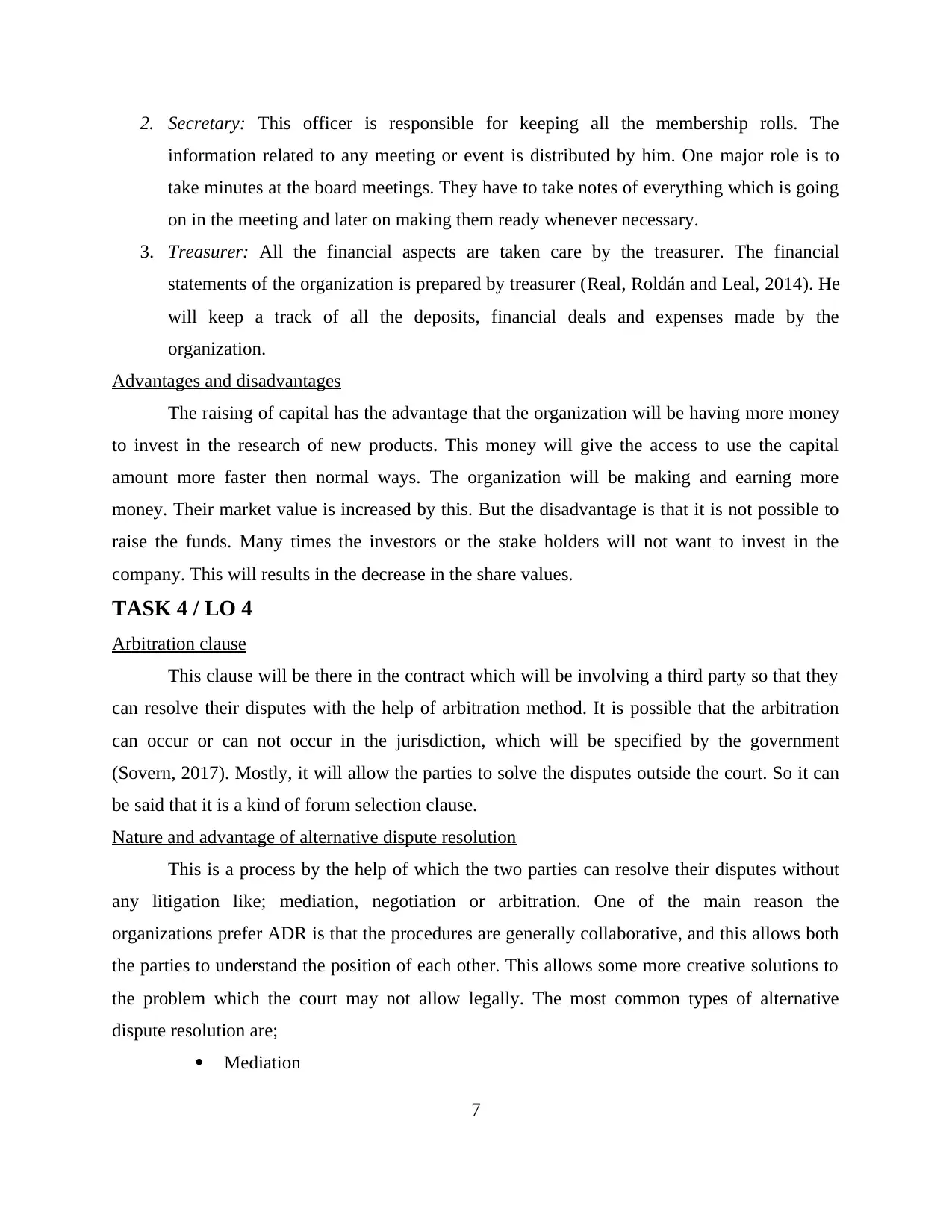
2. Secretary: This officer is responsible for keeping all the membership rolls. The
information related to any meeting or event is distributed by him. One major role is to
take minutes at the board meetings. They have to take notes of everything which is going
on in the meeting and later on making them ready whenever necessary.
3. Treasurer: All the financial aspects are taken care by the treasurer. The financial
statements of the organization is prepared by treasurer (Real, Roldán and Leal, 2014). He
will keep a track of all the deposits, financial deals and expenses made by the
organization.
Advantages and disadvantages
The raising of capital has the advantage that the organization will be having more money
to invest in the research of new products. This money will give the access to use the capital
amount more faster then normal ways. The organization will be making and earning more
money. Their market value is increased by this. But the disadvantage is that it is not possible to
raise the funds. Many times the investors or the stake holders will not want to invest in the
company. This will results in the decrease in the share values.
TASK 4 / LO 4
Arbitration clause
This clause will be there in the contract which will be involving a third party so that they
can resolve their disputes with the help of arbitration method. It is possible that the arbitration
can occur or can not occur in the jurisdiction, which will be specified by the government
(Sovern, 2017). Mostly, it will allow the parties to solve the disputes outside the court. So it can
be said that it is a kind of forum selection clause.
Nature and advantage of alternative dispute resolution
This is a process by the help of which the two parties can resolve their disputes without
any litigation like; mediation, negotiation or arbitration. One of the main reason the
organizations prefer ADR is that the procedures are generally collaborative, and this allows both
the parties to understand the position of each other. This allows some more creative solutions to
the problem which the court may not allow legally. The most common types of alternative
dispute resolution are;
Mediation
7
information related to any meeting or event is distributed by him. One major role is to
take minutes at the board meetings. They have to take notes of everything which is going
on in the meeting and later on making them ready whenever necessary.
3. Treasurer: All the financial aspects are taken care by the treasurer. The financial
statements of the organization is prepared by treasurer (Real, Roldán and Leal, 2014). He
will keep a track of all the deposits, financial deals and expenses made by the
organization.
Advantages and disadvantages
The raising of capital has the advantage that the organization will be having more money
to invest in the research of new products. This money will give the access to use the capital
amount more faster then normal ways. The organization will be making and earning more
money. Their market value is increased by this. But the disadvantage is that it is not possible to
raise the funds. Many times the investors or the stake holders will not want to invest in the
company. This will results in the decrease in the share values.
TASK 4 / LO 4
Arbitration clause
This clause will be there in the contract which will be involving a third party so that they
can resolve their disputes with the help of arbitration method. It is possible that the arbitration
can occur or can not occur in the jurisdiction, which will be specified by the government
(Sovern, 2017). Mostly, it will allow the parties to solve the disputes outside the court. So it can
be said that it is a kind of forum selection clause.
Nature and advantage of alternative dispute resolution
This is a process by the help of which the two parties can resolve their disputes without
any litigation like; mediation, negotiation or arbitration. One of the main reason the
organizations prefer ADR is that the procedures are generally collaborative, and this allows both
the parties to understand the position of each other. This allows some more creative solutions to
the problem which the court may not allow legally. The most common types of alternative
dispute resolution are;
Mediation
7
Paraphrase This Document
Need a fresh take? Get an instant paraphrase of this document with our AI Paraphraser
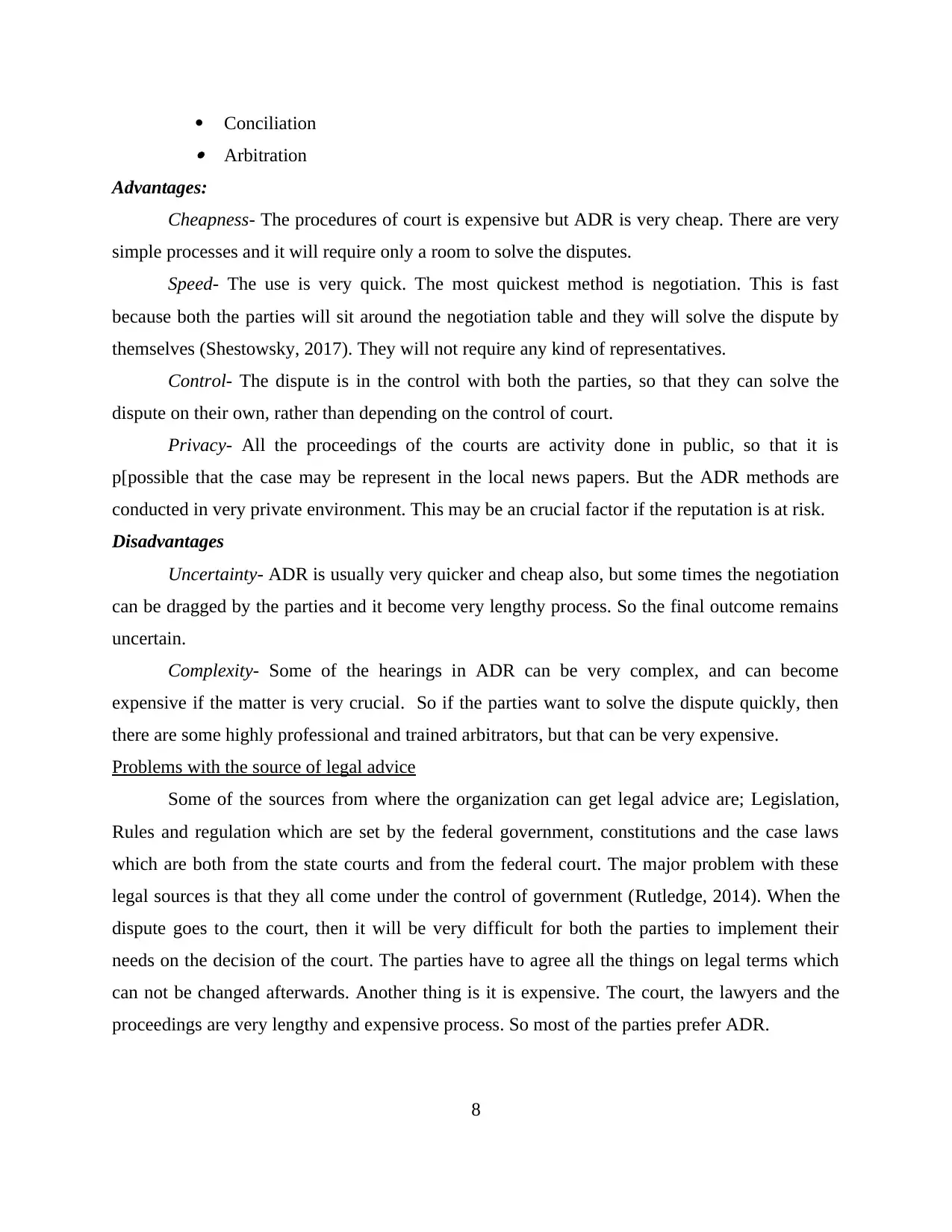
Conciliation
Arbitration
Advantages:
Cheapness- The procedures of court is expensive but ADR is very cheap. There are very
simple processes and it will require only a room to solve the disputes.
Speed- The use is very quick. The most quickest method is negotiation. This is fast
because both the parties will sit around the negotiation table and they will solve the dispute by
themselves (Shestowsky, 2017). They will not require any kind of representatives.
Control- The dispute is in the control with both the parties, so that they can solve the
dispute on their own, rather than depending on the control of court.
Privacy- All the proceedings of the courts are activity done in public, so that it is
p[possible that the case may be represent in the local news papers. But the ADR methods are
conducted in very private environment. This may be an crucial factor if the reputation is at risk.
Disadvantages
Uncertainty- ADR is usually very quicker and cheap also, but some times the negotiation
can be dragged by the parties and it become very lengthy process. So the final outcome remains
uncertain.
Complexity- Some of the hearings in ADR can be very complex, and can become
expensive if the matter is very crucial. So if the parties want to solve the dispute quickly, then
there are some highly professional and trained arbitrators, but that can be very expensive.
Problems with the source of legal advice
Some of the sources from where the organization can get legal advice are; Legislation,
Rules and regulation which are set by the federal government, constitutions and the case laws
which are both from the state courts and from the federal court. The major problem with these
legal sources is that they all come under the control of government (Rutledge, 2014). When the
dispute goes to the court, then it will be very difficult for both the parties to implement their
needs on the decision of the court. The parties have to agree all the things on legal terms which
can not be changed afterwards. Another thing is it is expensive. The court, the lawyers and the
proceedings are very lengthy and expensive process. So most of the parties prefer ADR.
8
Arbitration
Advantages:
Cheapness- The procedures of court is expensive but ADR is very cheap. There are very
simple processes and it will require only a room to solve the disputes.
Speed- The use is very quick. The most quickest method is negotiation. This is fast
because both the parties will sit around the negotiation table and they will solve the dispute by
themselves (Shestowsky, 2017). They will not require any kind of representatives.
Control- The dispute is in the control with both the parties, so that they can solve the
dispute on their own, rather than depending on the control of court.
Privacy- All the proceedings of the courts are activity done in public, so that it is
p[possible that the case may be represent in the local news papers. But the ADR methods are
conducted in very private environment. This may be an crucial factor if the reputation is at risk.
Disadvantages
Uncertainty- ADR is usually very quicker and cheap also, but some times the negotiation
can be dragged by the parties and it become very lengthy process. So the final outcome remains
uncertain.
Complexity- Some of the hearings in ADR can be very complex, and can become
expensive if the matter is very crucial. So if the parties want to solve the dispute quickly, then
there are some highly professional and trained arbitrators, but that can be very expensive.
Problems with the source of legal advice
Some of the sources from where the organization can get legal advice are; Legislation,
Rules and regulation which are set by the federal government, constitutions and the case laws
which are both from the state courts and from the federal court. The major problem with these
legal sources is that they all come under the control of government (Rutledge, 2014). When the
dispute goes to the court, then it will be very difficult for both the parties to implement their
needs on the decision of the court. The parties have to agree all the things on legal terms which
can not be changed afterwards. Another thing is it is expensive. The court, the lawyers and the
proceedings are very lengthy and expensive process. So most of the parties prefer ADR.
8
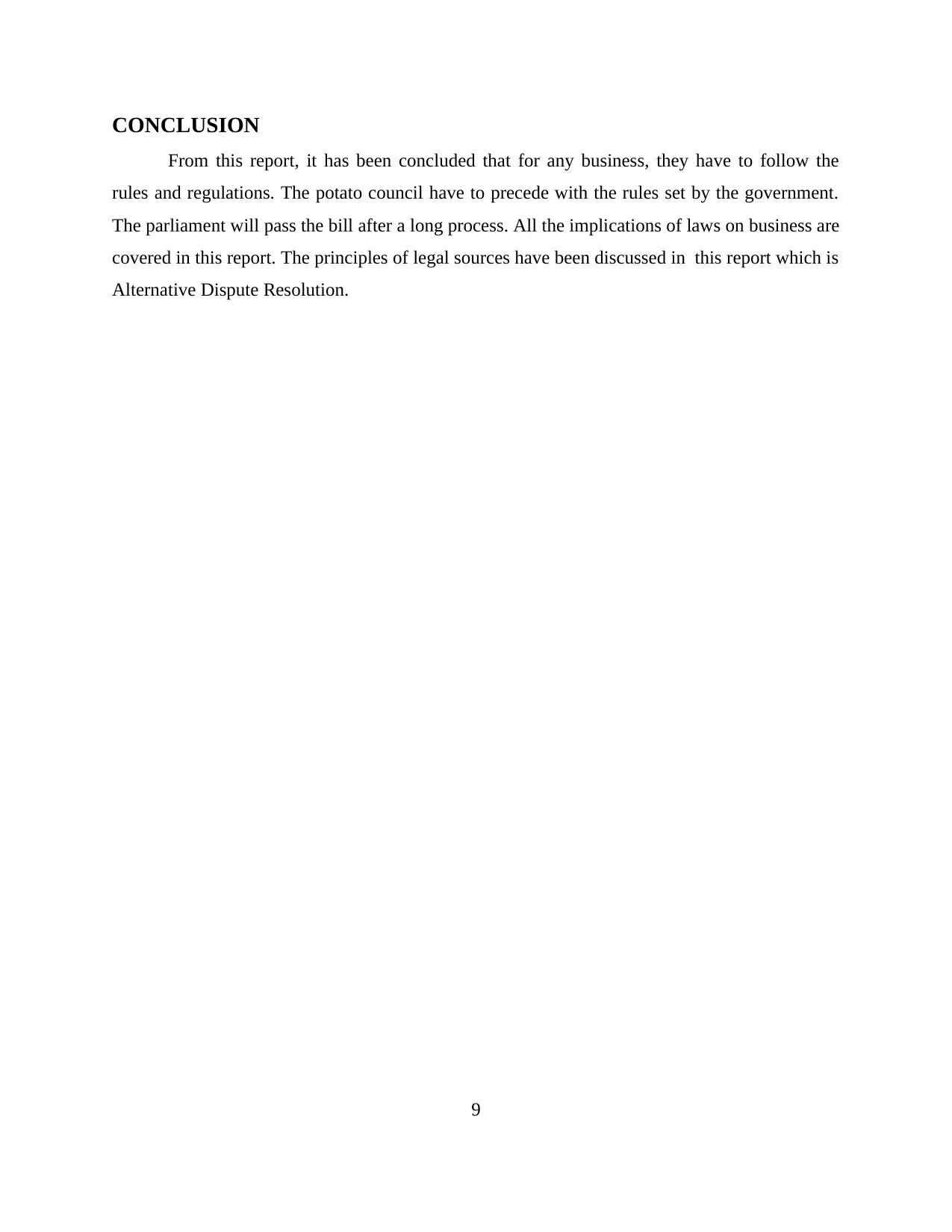
CONCLUSION
From this report, it has been concluded that for any business, they have to follow the
rules and regulations. The potato council have to precede with the rules set by the government.
The parliament will pass the bill after a long process. All the implications of laws on business are
covered in this report. The principles of legal sources have been discussed in this report which is
Alternative Dispute Resolution.
9
From this report, it has been concluded that for any business, they have to follow the
rules and regulations. The potato council have to precede with the rules set by the government.
The parliament will pass the bill after a long process. All the implications of laws on business are
covered in this report. The principles of legal sources have been discussed in this report which is
Alternative Dispute Resolution.
9
⊘ This is a preview!⊘
Do you want full access?
Subscribe today to unlock all pages.

Trusted by 1+ million students worldwide
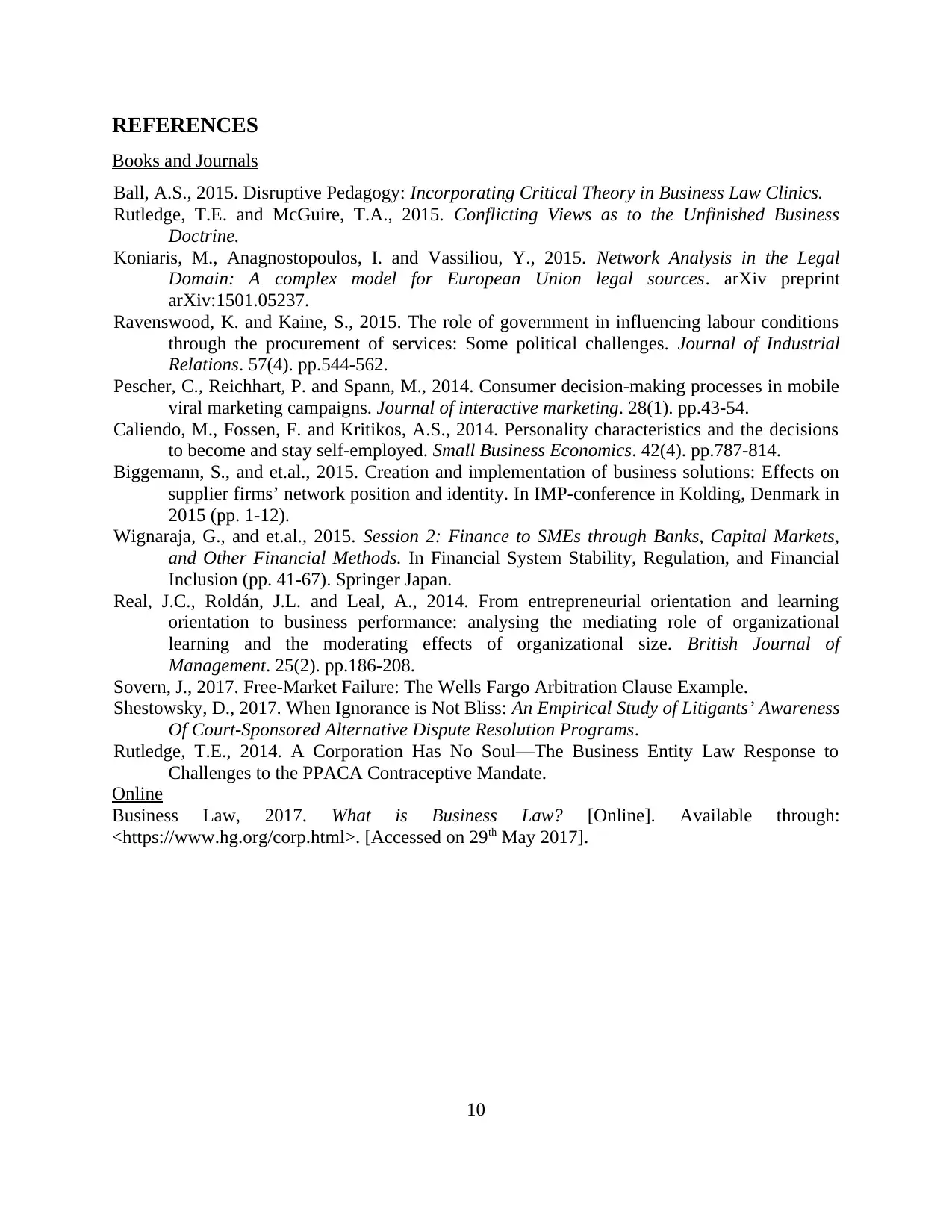
REFERENCES
Books and Journals
Ball, A.S., 2015. Disruptive Pedagogy: Incorporating Critical Theory in Business Law Clinics.
Rutledge, T.E. and McGuire, T.A., 2015. Conflicting Views as to the Unfinished Business
Doctrine.
Koniaris, M., Anagnostopoulos, I. and Vassiliou, Y., 2015. Network Analysis in the Legal
Domain: A complex model for European Union legal sources. arXiv preprint
arXiv:1501.05237.
Ravenswood, K. and Kaine, S., 2015. The role of government in influencing labour conditions
through the procurement of services: Some political challenges. Journal of Industrial
Relations. 57(4). pp.544-562.
Pescher, C., Reichhart, P. and Spann, M., 2014. Consumer decision-making processes in mobile
viral marketing campaigns. Journal of interactive marketing. 28(1). pp.43-54.
Caliendo, M., Fossen, F. and Kritikos, A.S., 2014. Personality characteristics and the decisions
to become and stay self-employed. Small Business Economics. 42(4). pp.787-814.
Biggemann, S., and et.al., 2015. Creation and implementation of business solutions: Effects on
supplier firms’ network position and identity. In IMP-conference in Kolding, Denmark in
2015 (pp. 1-12).
Wignaraja, G., and et.al., 2015. Session 2: Finance to SMEs through Banks, Capital Markets,
and Other Financial Methods. In Financial System Stability, Regulation, and Financial
Inclusion (pp. 41-67). Springer Japan.
Real, J.C., Roldán, J.L. and Leal, A., 2014. From entrepreneurial orientation and learning
orientation to business performance: analysing the mediating role of organizational
learning and the moderating effects of organizational size. British Journal of
Management. 25(2). pp.186-208.
Sovern, J., 2017. Free-Market Failure: The Wells Fargo Arbitration Clause Example.
Shestowsky, D., 2017. When Ignorance is Not Bliss: An Empirical Study of Litigants’ Awareness
Of Court-Sponsored Alternative Dispute Resolution Programs.
Rutledge, T.E., 2014. A Corporation Has No Soul—The Business Entity Law Response to
Challenges to the PPACA Contraceptive Mandate.
Online
Business Law, 2017. What is Business Law? [Online]. Available through:
<https://www.hg.org/corp.html>. [Accessed on 29th May 2017].
10
Books and Journals
Ball, A.S., 2015. Disruptive Pedagogy: Incorporating Critical Theory in Business Law Clinics.
Rutledge, T.E. and McGuire, T.A., 2015. Conflicting Views as to the Unfinished Business
Doctrine.
Koniaris, M., Anagnostopoulos, I. and Vassiliou, Y., 2015. Network Analysis in the Legal
Domain: A complex model for European Union legal sources. arXiv preprint
arXiv:1501.05237.
Ravenswood, K. and Kaine, S., 2015. The role of government in influencing labour conditions
through the procurement of services: Some political challenges. Journal of Industrial
Relations. 57(4). pp.544-562.
Pescher, C., Reichhart, P. and Spann, M., 2014. Consumer decision-making processes in mobile
viral marketing campaigns. Journal of interactive marketing. 28(1). pp.43-54.
Caliendo, M., Fossen, F. and Kritikos, A.S., 2014. Personality characteristics and the decisions
to become and stay self-employed. Small Business Economics. 42(4). pp.787-814.
Biggemann, S., and et.al., 2015. Creation and implementation of business solutions: Effects on
supplier firms’ network position and identity. In IMP-conference in Kolding, Denmark in
2015 (pp. 1-12).
Wignaraja, G., and et.al., 2015. Session 2: Finance to SMEs through Banks, Capital Markets,
and Other Financial Methods. In Financial System Stability, Regulation, and Financial
Inclusion (pp. 41-67). Springer Japan.
Real, J.C., Roldán, J.L. and Leal, A., 2014. From entrepreneurial orientation and learning
orientation to business performance: analysing the mediating role of organizational
learning and the moderating effects of organizational size. British Journal of
Management. 25(2). pp.186-208.
Sovern, J., 2017. Free-Market Failure: The Wells Fargo Arbitration Clause Example.
Shestowsky, D., 2017. When Ignorance is Not Bliss: An Empirical Study of Litigants’ Awareness
Of Court-Sponsored Alternative Dispute Resolution Programs.
Rutledge, T.E., 2014. A Corporation Has No Soul—The Business Entity Law Response to
Challenges to the PPACA Contraceptive Mandate.
Online
Business Law, 2017. What is Business Law? [Online]. Available through:
<https://www.hg.org/corp.html>. [Accessed on 29th May 2017].
10
1 out of 10
Related Documents
Your All-in-One AI-Powered Toolkit for Academic Success.
+13062052269
info@desklib.com
Available 24*7 on WhatsApp / Email
![[object Object]](/_next/static/media/star-bottom.7253800d.svg)
Unlock your academic potential
Copyright © 2020–2026 A2Z Services. All Rights Reserved. Developed and managed by ZUCOL.





